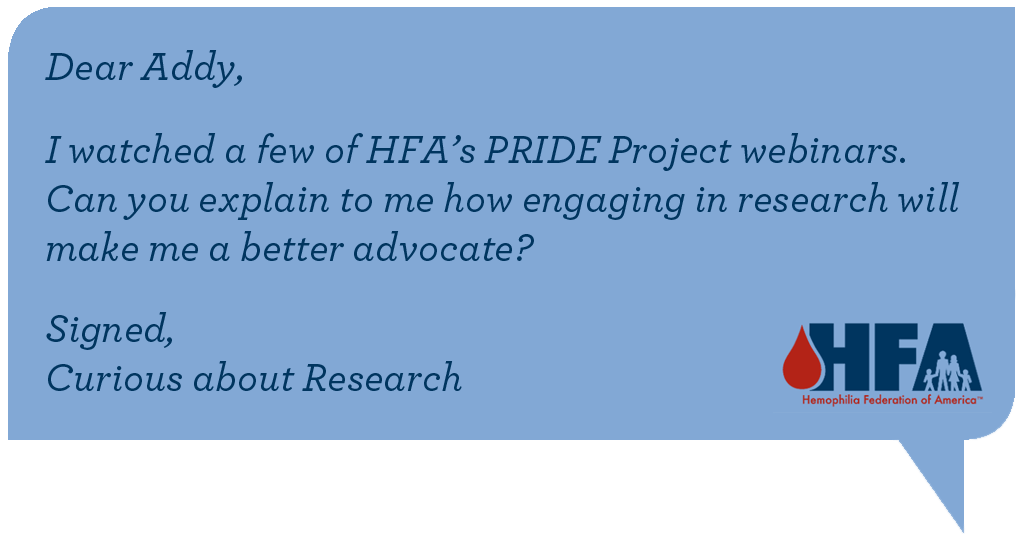
Dear Addy,
I watched a few of HFA’s PRIDE Project webinars. Can you explain to me how engaging in research will make me a better advocate?
Signed,
Curious about Research
Dear Curious,
It’s great to hear that you watched some of the PRIDE Project webinars, as those webinars provide an introduction to and basic training on two types of research that are grounded in incorporating patients’ voices and participation: patient-centered outcomes research and comparative effectiveness research. These two approaches to research actively seek patient involvement from the very beginning of planning through completion of the project.
Engaging in research as a patient can happen in two ways: as a research participant or as a member of the research team.
As a research participant:
Traditionally, you, as a patient, can become a research participant by simply answering questions on research surveys, providing biological material (e.g., blood sample), and other health measures (e.g., blood pressure) to which you consent. The findings from any of the research projects you participate in can help provide information to support rules and policies in which you are invested. Vice versa, the same findings can help you argue against rules and policies you don’t support.
As a member of a research team:
Patients can also participate in research by being actively involved in development of research projects from the very beginning. Although this may seem daunting, the process can be as simple as posing a question you may have to your doctor. A simple example could be that you’re interested in the impact of different physical sports on people with bleeding disorders. This can motivate your doctor or his/her colleagues to launch a project to compare different physical activities. You can further drive the project along by being a subject matter expert as a patient. In this role, you are advocating for a topic or interest that may also be of interest to others in the community.
Patient engagement in research provides you, patient advocacy organizations such as HFA, and others the information to effectively make an argument in support of or against particular policies. Engaging and being well versed in basic research can help you effectively advocate on issues that are important to you.
Have you visited HFA’s Learning Central yet? Visit “The University” and you will be able to learn more about participating in research and listen to bleeding disorders community members who, through their own participation in research, have helped drive the design of research projects.
Sincerely,
Addy
Have a question? Click HERE. Your name will be changed in the response.
HFA frequently receives questions from the bleeding disorders community related to advocacy issues. The questions often impact the entire community. In an effort to reach the largest audience possible with our responses to these widely applicable questions, HFA developed “Dear Addy.” Questions submitted to this column are edited in order to protect privacy and should be considered educational only, not individual guidance.



